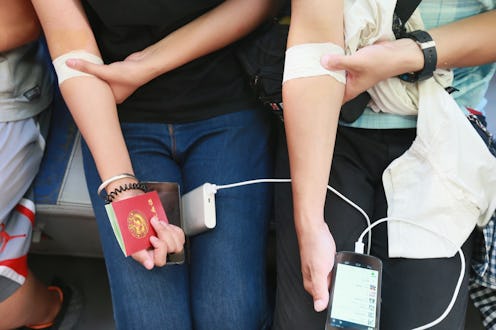Life
Donating Blood If You've Been To A Foreign Country
Now's a great time to think about giving blood, even if you've never done it before. June 14 is World Blood Day and the theme of 2016's event is, "Blood connects us all" — a phrase that hits even closer to home after the mass shootings at the Pulse nightclub in Orlando early Sunday. 49 people were killed and at least 53 were wounded, leading Orlando mayor Buddy Dyer and Florida Governor Rick Scott to declare the city in a "state of emergency." In the days since this tragedy, many people have come forward to show their support to the victims, their families, and the LGBTQ community in all kinds of ways — and one of the most important ways has been donating blood to the injured.
This past Sunday, more than 5,300 people donated blood through Florida's OneBlood donation center after they put out an urgent call for blood online. According to Susan Forbes, the vice president for marketing and communications at OneBlood, speaking to CNN, this was a single-day record. It has certainly put the concept of giving blood at the forefront of our minds, but it's important to remember that the victims of the Orlando shootings aren't the only ones who can benefit from donated blood.
In the U.S. alone, someone needs blood every two seconds. 62 countries around the world get 100 percent of their blood supply from voluntary, unpaid donors like you and me. And even a single visit can make a very real difference — just one donation of blood could potentially save three lives. In other words, your blood can go a long way. There are some requirements that have to be met, though, in order to judge whether you are healthy enough to donate your blood. A common question many people ask is: Am I eligible to donate blood if I've been out of the country?
It's an important question to ask before you line up at a blood drive. There isn't really a simple answer, so we'll start with this: If you've traveled outside of the United States and Canada in the last three years, you'll have to go through some red tape before you get the green light to donate blood.
Go to the blood donation center with your travel details, such as where you traveled to, which dates you traveled, and your transportation particulars. Depending on which organization you want to donate blood to, there will likely be a travel form you can fill out before you arrive, ensuring that you're fully prepared. Staff members at the donation center will be able to assess whether you can donate when you're there. If you want to be proactive, the American Red Cross provides a phone number you can call, where you can speak with an eligibility specialist before you go donate.
Right now, one of the greatest blood-borne dangers that blood donation centers are concerned about is the Zika virus. If you have recently visited a country where the Zika virus has known to be spreading in the last four weeks, the American Red Cross requests that you hold off on giving blood for 28 days. The Center for Disease Control and Prevention (CDC) website lists all the countries where Zika has been active, which include Brazil, Ecuador, and Mexico, as well as Fiji, Cape Verde, and Papua New Guinea. Really, if you've been anywhere in Mexico, the Caribbean, or Central or South America in the past month, you can't donate blood at the moment.
It's also worth noting that if you do fit within the guidelines and give blood, yet still come down with Zika symptoms 14 days of your donation, contact the organization so your blood can be quarantined.
There's also the risk of malaria — the disease transmitted by mosquito bites — to consider. To find out if your potential exposure to malaria makes you unable to give blood, first visit the CDC website to see the full list of malaria-risk countries. If you've traveled to any of them within the last 12 months, you'll have to hold off until you've been back in the States for a year before you give blood. Additionally, if you've spent five or more years living in any of the malaria-risk countries, or received treatment for malaria, you have to wait three years before you're able to donate in the U.S..
Finally, anyone who has spent prolonged periods of time in countries that are at risk for mad cows disease, such as the Czech Republic, Spain, and Germany, isn't able to donate at all.
If you have any specific questions about your own travels, contact organizations like OneBlood and The Red Cross, who will be able to walk you through the process. Whatever you do, don't be discouraged if you're a globe trotter who has been to any of the above countries. If your heart is set on donating blood to help people who need it most, you'll make it happen in due time.
